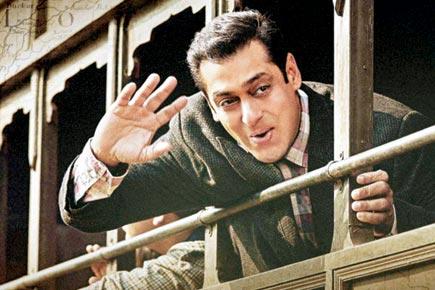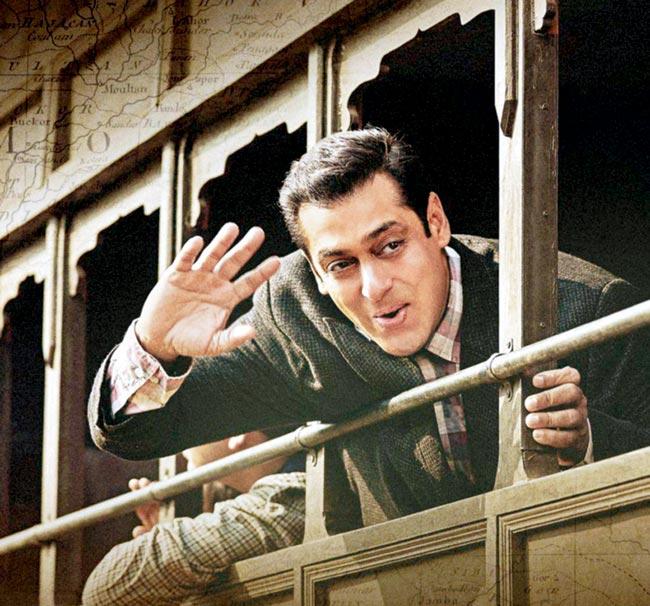I am a big fan of Kabir Khan


 I am a big fan of Kabir Khan. There's a lot to admire in his films - as well as his politics - including in Kabul Express, Ek Tha Tiger and Bajrangi Bhaijaan, even if they are not perfect films. But, my favourite remains The Forgotten Army (1999), his outstanding documentary on the Indian National Army.
I am a big fan of Kabir Khan. There's a lot to admire in his films - as well as his politics - including in Kabul Express, Ek Tha Tiger and Bajrangi Bhaijaan, even if they are not perfect films. But, my favourite remains The Forgotten Army (1999), his outstanding documentary on the Indian National Army.
ADVERTISEMENT
Kabir Khan's Tubelight is about two inseparable brothers Laxman Singh Bisht (Salman Khan, dim-witted) and Bharat (Sohail Khan), and whether, when Sohail joins the army to fight in the Indo-China war of 1962, Salman's unshakeable faith that his brother will return, is redeemed. Along the way, Salman discovers that the “enemy”, Indians of Chinese descent - Liling (Chinese actress Zhu Zhu) and her son Guo (the adorable Arunachali boy Matin Rey Tangu) - are friendly People Like Us.
The trouble is, the screenplay tries to weave too many unrelated strands into a single plait, so the film falls between multiple stools. The film is an official adaptation of the American movie Little Boy, about an eight-year-old realising the futility of war, here played by Salman. Tubelight is actually an Indian bhai-bhai love story of two brothers that squeezes in a Hindi-Chini bhai bhai philosophy. It also comments on how faith moves mountains, on the wisdom of fools; on how minorities, including Muslims and Indians from the North East, are being savaged and humiliated in India; on Gandhian principles of making friends with the enemy. Upar se, he is also determined to tap the Chinese market by casting Chinese star Zhu Zhu. Releasing on Eid weekend, this is a Salman fan-pleaser about the innocent man-boy-star who can do no wrong - never mind his real-life involvement in court cases concerning the killing of a homeless man and endangered black bucks. But, the rest may be underwhelmed.
Khan uses a familiar trick: when Chinese directors cannot openly comment on current events, they try to deflect censors by placing their films in a period setting, here 1962. Also, you sense that Khan really wants to comment on how horrifically the Indian majority treats minorities, including Muslims, but rather than the volatile Indo-Pak border, he moves his story east to the Indo-Chinese border, where it sits unconvincingly. He makes important points about how badly we treat Indians from the North East too, but his story prefers to make them “Indians of Chinese descent”. But all these political comments come wrapped in broad comedy. It also uses another familiar trope, of fools delivering pearls of wisdom, as we saw in My Name is Khan, Forrest Gump and more.
Tubelight is not the first Indo-Chinese themed film with complicated politics. V Shantaram's Dr Kotnis ki Amar Kahani (1946), is a fascinating film based on the real-life story of an Indian doctor who served in China during the Japanese invasion of China in World War II. Its Hindi-Chini bhai-bhai was propelled not so much by any love of the average 'Hindi' for the 'Chini,' but the film got scarce raw stock from the British as a "war effort" film against the Axis powers.
Khan's Bajrangi Bhaijaan was a marvellously entertaining take on Hindu-Muslim/Indo-Pak amity, in which a hardcore Hindu hero discovers his humanity and restores a lost girl to her family in Pakistan, never mind the saccharine. Khan's preoccupation with this familiar theme continues in Tubelight. But, at 51, Salman struggles so hard to play the innocent man-boy, you feel bad for him. By contrast, Zhu Zhu is poised, while Matin Rey Tangu often steals the show. Aseem Mishra's cinematography is top notch, although the editing by Rameshwar Bhagat could have been tighter. The film has wall-to-wall music by Julius Packiam, but some of Pritam's songs include lovely folk music.
As a mirror and a response to the majoritarian oppression of minorities, Tubelight is a measure of the desperate fare we can get when a conscientious filmmaker makes a political mainstream film. And when a regressive censor board snips out anything progressive or politically inconvenient. Of course, Iranian cinema turns out jewels working with similar restrictions, so there is no excuse for bad cinema. Tubelight is a disappointing film from the gifted Kabir Khan. Why else would he name his goody-goody brothers in an Indo-China story after characters in the Ramayana - Laxman and Bharat - other than to appease right-wing censors?
Meenakshi Shedde is South Asia Consultant to the Berlin Film Festival, award-winning critic, curator to festivals worldwide and journalist. She can be reached on meenakshishedde@gmail.com
 Subscribe today by clicking the link and stay updated with the latest news!" Click here!
Subscribe today by clicking the link and stay updated with the latest news!" Click here!







